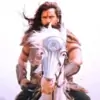Imagine a Brahmin (whose normal image in our minds is of someone with a 'choti' at the back of his clean shaven bare head, one who recites the mantras and officiates in rituals and ceremonies) wielding the deadly dandapatta* sword in hand, with kataar* (a traditional Rajput / Maratha dagger) tucked across his waist, armor covering his chest, head and arms, riding a horse while chewing the red chillies, with single minded focus to wrought havoc on the enemy lines.
{ I'm using the approximate translation. }
Two personalities loom large in the history of the Marathas - Shivaji the founder of the independent Maratha Power and Shrimant Peshwa Bajirao I, the founder of the Maratha empire. They tower head and shoulders above their contemporaries : their policies and actions completely influenced and moulded the shape of things to come. Bajirao (or, Rau) is looked upon as the greatest personality after Shivaji in Maratha history and rated among the finest cavalry leaders in the 'world' history. In the long and distinguished galaxy of Peshwas, Baji Rao Ballal was unequalled for the daring and originality of his genius and the volume and value of his achievements. The story of his career has an abiding interest. His achievements may be summed up as the establishment of Maratha supremacy in the Deccan and of political hegemony in the north. When he was called to the Peshwaship in 1720 the Maratha state was in a perilous condition. It was a house divided against itself, menaced on the east & south by the great Nizam-ul-mulk, and large part of its territory on the western seaboard was in foreign hands, with the Portuguese navy. At his death he left the Maratha nation strong and united, its friendship solicited by Rajputs and Bundelas and its alliance courted by the Mughal rulers. The policy of northward drive the Peshwa pursued so vigorously soon brought the Marathas to the gates of the imperial city and made them not the rulers BUT the dictators of the Mughal Imperial policy.
Bajirao was not a man, he was a phenomenon. His military victories and strategies are studied by military historians today, and were a topic of study for the British-American generals. The 'Spartan General' Field Marshal Bernard Law Montgomery (died 1976), a senior British Army general & a military tactician, who fought in both the First and the Second World War, called Bajirao's victory at Palkhed over the Nizam in 1737 as a "masterpiece of strategic mobility". In his book, "History of Warfare", he has compared the Peshwa Bajirao's battle tactics to that subsequently made famous by U.S. Civil War General William Tecumseh Sherman during his 1864 "March to the Sea" : the use of rapid movements where his troops lived off the land, with minimal concern for their own supply and communication lines, and employing "total warfare" on the enemy population. Most (almost all) of Bajirao's victory were against the numerically superior enemies. No wonder, once Chatrapati Shahu was asked to chose either Bajirao or a force of 10,000 soldiers , Shahu chose Bajirao over the force of 10,000.
Everyone remembers him as a fighter, a lover, a warrior, an undefeated cavalry general who replaced the crescent & planted the saffron across the Deccan & came knocking to the doors of the capital of India - Delhi. Within just 20 years he converted a kingdom of 2 districts into a great Empire extending till Delhi, which was further increased in another 20 years till the Fort of Attock under the command of his sons. But how he achieved this prowess ? What were his origins ? His rise to such a position was preceded by great toil and hardships faced by his predecessors.
Bajirao's forefathers were the revenue collectors in Zanjira. His father started his career as a petty salt collector. To escape the harassment of the Chief of Zanjira, his father Balaji Vishwanath, much to his agony, left his ancestral homeland and settled at Saswad. His knowledge of revenue matters made his services welcome to the Maratha chiefs. The times following Shivaji's demise were stormy. The revenue had to be collected not in a settled country, but from a territory which was overrun and occupied by armies. This kind of work required a man who knew not merely the intricacies of revenue problems, but could cajole the peasantry and Mughal officials or fight the latter when necessary. Balaji Vishwanath's qualities eminently fitted him for this task. He rose to become the Sabhasad of Pune, then rose to become the Subahdar of Pune and in 1702 is found defending Sinhagad under the command of the Maratha stalwart Dhanaji Jadhav. Later, he worked as Subahdar of Daulatabad. In one of the Peshwa documents, we find records of him mediating for the release of Chatrapati Shahu from the captivity of Mughal Emperor Aurangzeb using back-door diplomacy (or, track 2 diplomacy in modern terms). Then, he rose to the post of Diwaan of the Senapati, and with Khandav Ballal persuaded his master to espouse the cause of Shahu who had returned to the Deccan, and thus helped his king to win his first important victory at Khed. Shahu on his coronation in January 1708 conferred on Balaji the title of " Senakarte " - the maker of armies, showing the high estimation in which he was even then held by his royal master.
Bajirao was trained under his father in diplomacy and war. The education of a Brahmin boy in reading, writing, accounts and a little Sanskrit was a matter of course. But he did not remain long confined to his books. From very early times he showed a special aptitude for the military profession and accompanied his father in several expeditions. He was with his father when the latter was tracked down like a hunted animal by the infuriated Senapati in 1710 when Bajirao was just 10-11 years old and at the age of 12 we find him participating in a war. At the age of 16 he shared his father's imprisonment at the hands of the rebel Maratha chief Dhamaji Thorat when he had to subsist on parched rice and gur (jaggery) for his survival. During the last two years of his father's premiership he held an important military command under him when he was just 18 years old and visited the Delhi Court.
Shivaji created an independent Maratha state by rallying round himself patriotic bands : the independent existence of this state was challenged by the Mughal Government, its territories overrun, armies dispersed and its ruler Sambhaji beheaded. The Marathas recovered their independence after a most heroic struggle. But so long as a powerful neighbour could assail it, they could never rest in security. By defeating the Nizam the representative of the Mughals and the only other power that counted in the Deccan, Bajirao forced him to acknowledge that he could never hope to weaken the Maratha authority either by sowing dissensions or by a trial of arms so long as the Peshwa was at the helm.
Such an achievement alone would have been most creditable and given the Peshwa a permanent place in the history. His policy however extended beyond the security of his homeland. He aimed at establishing Maratha hegemony beyond the Narmada. Gifted with a majestic imagination, he realized as none of his contemporaries did, that the time had come to challenge the Mughal authority in the north. He perceived that the far-flung empire of the Mughals had lost its vitality and was tottering to its fall, and he hastened to grasp that power. Despite opposition from the other Maratha faction at the court who doubted the thinking of a 20 year old "unexperienced young boy", he remained determined to hasten the fall of the crumbling Mughal Empire. For this purpose he cleverly utilised the mutual jealousies and hatreds prevailing among the court factions of Delhi.
What was the secret of the Peshwa's success? What enabled him to fill all these 20 years with resounding successive victories in 41 battles, some of which were fought against the most seasoned and experienced generals of that age ? The answer must be sought in his character and his able generalship. He had all the qualities that made him a tower of strength to his state "character, persistence and energy. High purpose, abounding faith and courage and an intimate knowledge of the political situation. His early training under his father, a masterful personality, inculcated in him habits of strenuous activity and patient perseverance, qualities so essential for ensuring success. In a sea of unrest he spent his childhood at Saswad, Pune, Satara, with the din of battle ringing in his ears. Always.
He was not only a "chiselled warrior" who knew where to strike with the precision of a surgeon, but also a gifted diplomat. He used to exchange letters with his brother Chima ( aka Chima Ji Appa ) and in these letters we get a glimpse of the ambition / vision which the 2 sons of Balaji Vishwanath had. In these letters, we get to know their innermost thoughts. Repeatedly, Bajirao writes to his brother that - "Killing the population of the defeated territories to instill terror (which was the norm those days) was not his objective. Neither his objective was to bring about the total annihilation of the enemy. His purpose was to achieve the maximum benefit from his enemies with minimum possible loss of lives." In short, he wanted to win over with enemies, with as less effort as possible.
If we study his military campaigns, we see that, he tried to avoid direct confrontation in the war field. Because, even if he won, he would lose some of his own soldiers too, which he wanted to avoid at any cost. He chose the place and time of his own, which always resulted in minimum loss of lives.
It is said that a great military leader should always know when, where, how to fight. But Bajirao, in addition to knowing these things, also knew when NOT to fight. He would chose his own place, time and method. Bajirao concentrated on using local terrain to cut the enemy supply-lines with the help of rapid troop movement. He followed Maratha traditional tactics of encircling the enemy quickly, appearing from the rear of enemy, attacking from the unexpected direction, distracting the enemy's attention, keeping the enemy off balance, and deciding the battlefield on his own terms. He humbled the mighty and highly experienced Nizam, not once, but twice, and also his son Nasir in the last battle of his life.
While barely ten years of age he began to accompany his father in his expeditions and acquainted himself first hand with the peculiar Maratha character and the problems confronting his land. Thus when he succeeded to the Peshwaship he brought with him all this experience with the dashing energy of youth. Within ten years he had established his reputation at home and abroad.
A historian described him as "a man true of his words and trusted by his King''. Foreign potentates like Jai Singh, the Nizam, Saadat Khan and Muhammed Khan Bangash vied with each other in seeking his friendship. Maratha commanders confident in his leadership, flocked to his banner preferring to serve under him rather than under any other commander.
An Englishman passing near Pune in 1739 noted that - "Such is belief of the Marathas in Bajirao that at his mere call, an army of 1000s of soldiers can be collected within a matter of few hours. His men follow him faithfully wherever he goes."

In the memory Bajirao remains a soldier first and last. He was never so long at home as in his camp. Throughout the twenty years of his Peshwaship he was ever on the move, marching and fighting, living on the simplest fare and sharing the hardships and toils of his men. His personal courage endeared him to his soldiers while his example inspired them. He walked fearlessly into the enemy's camp and sought to gain his point as much by personal meetings as by an appeal to arms.
Liberal in rewarding merit, he was strict in exacting discipline and work. Cowardice and remissness were the two things which he hated the most in his men, and when he detected the least sign of them he came down upon the offender with a heavy hand.
Not only were great chiefs rewarded for their gallant conduct in action, but even common soldiers were stimulated to exertions by promotions and rewards. When Raja Shahu had occasion to express doubts about the efficiency of the Peshwa's infantry, he was immediately contradicted by Fateh Singh (who was no admirer of the Peshwa) with the remark, " That the Peshwa was not neglecting his infantry, that he kept his entire army in good trim and ready for any emergency."
He had an eye for recognising ability wherever it might happen to be; caste and class were no bar to promotion. He ate - sitting with his soldiers. He was far off from the orthodox sentiments of that age, which can be seen during his love affair with Mastani and also in his eating habits which had non - vegetarian food. Holkar and Sindhia (who later carved out separate autonomous provincial dynasties) who rose to the first rank under him had been just common soldiers under his father : Govind Ballal Kher was a personal attendant. When he had made his choice he placed entire confidence in his chiefs stimulating them to exertion by his example. Under him rose to fame Pilaji Jadhav, Sindhia, Holkar, the Pawars, the Retrekars, the Phadkes, Vinchurkars, Bundelas and a host of chiefs.
If Bajirao was great as a soldier, he was greater still as a general. Sir Sarkar calls him "a heaven-born cavalry leader" . His skill lay in manoeuvering large bodies of cavalry with surprising speed. It was the Peshwa's celerity that brought the exceedingly powerful Nizam down to his knees in 1728 and forced him to sign the treaty of defeat. His lightning speed enabled him to surprise Muhammed Bangash and save Bundelkhand from destruction and it was his and only his outwit that the imperialist commanders were thrashed at Agra in 1737. With speed he combined the element of surprise. Clever general that he was, he acquainted himself with the situation of his opponents and delivered his attack at a point where it was least expected or even impossible to expect. Bajirao kept his plans to himself, carefully obtained minute information of the enemy forces and then moving by unfrequented paths, appeared before the enemy only to cause consternation. He thus kept the initiative of his campaigns to himself and left the enemy guessing.
The Palkhed campaign, the Peshwa's offensive against Janjira, his dash on Delhi all bear out the above remark. At Palkhed after tiring out his enemy with marching and counter marching he came upon him in a difficult tract of country and cut off his water supply. In the 1737 campaign he retired to a little distance from Gohad and then making a long detour marched on Delhi. So secret were his movements that the defenders of the capital could not for some time believe that the Peshwa had succeeded in eluding their armies.
The light equipment of Bajirao's armies made their greater speed possible. Well knowing his own weakness in artillery due to the limited financial resources, the Peshwa avoided closing with his adversary : he drew him out of his cover, surrounded him with his numerous hordes and cutting off his supplies brought him to his knees. This was how the seasoned general Nizam was defeated at Palkhed and Bhopal - TWICE, by a comparatively young boy.
Cool and unmoved by a situation of even the utmost danger, the man was full of resources and ready to meet any emergency. The strong detachment sent by him into the Doab in 1737 was routed and had returned in utmost confusion. Three large armies blocked his way towards Agra. Any other person in his position would have quailed and beaten retreat, imperilling his new conquests. But! Bajirao rose to the occasion and by his superior tactics and mobility baffled his enemies.

Courteous in his manners he made war like a gentleman. Never in his correspondence does a vile phrase about his enemies escape him though his opponents (e.g., Asaf Jah) choose to call him " villain ". He had the ancestral capital of the Mughals at his mercy in 1739 after taking it under control, but he preferred to retire rather than destroy it and lay it under the sword, which was always his policy. When the Nizam, hard pressed at Bhopal, opened negotiations and desired the Peshwa to withdraw to a little distance, the Peshwa agreed, out of deference / respect for his opponent's age!!
Lastly, Bajirao is reported to be a very handsome man. Several documents reveal this fact. In the court of the ruler of Jaipur, the ladies were trying to get just a glimpse of Rau during his visit. At another instance, when Shrimant went to the tent of Nizam to settle the terms of a treaty, such was the pull that the ladies of the Nizam household showered pearls on him, standing from behind the curtains.
Note:
1. Radha Bai :
It was not possible to give attention to the mother of Peshwa Bajirao in this short post. She played a great role in moulding the characters of her two sons - Bajirao and Chima. Her role in the life of her sons was same as the one played by Jija Bai in the life of Chatrapati Shivaji. She was the matriarch in the Peshwa family.
2. Chimaji Appa :
It is said that the great victories of Bajirao have eclipsed his name. But from contemporary sources, and the letters exchanged between the 2 brothers, one gets an idea, that those victories in some manner belonged to Chimaji too. If not more, then in no manner was Chimaji lesser than Bajirao in any aspect. The 2 brothers, for the 20 years, worked as a team, carefully planning out their course of action. While one brother was busy fighting on the land, the other brother was busy fighting the foreign forces in the waters. It is to the credit of Chimaji that the Portugues naval fleet which had established its stronghold on the West coast of India was destroyed. . The high watermark of his career was the capture of Vasai fort from the Portuguese in a long and a hard fought battle, on the Western coast of India.
3. Sisters of Bajirao & Chima : Bhiu Bai and Anu Bai :
Bhiu was married to Babu Rao, whose elder brother Naik Joshi lend loan to the Peshwa Government. Joshi was ambitious and dreamed of being the Peshwa someday. Anu was the youngest and favorite sister of Rau, married to Venkat Rao. Anu lived for a very long time and had great influence in the Peshwa family. I have seen her painting where she can be seen doing horse riding. Unfortunately, i did not take the picture.
4. Kashibai :
The first wife of Shrimant Bajirao Peshwa. A lady with great grace and soft heart. She had a leg ailment. She also took care of the son of Bajirao and Mastani after their death.
5. Mastani :
Bajirao's muse from Bundelkhand. She is reported to be a follower of the Pranami sect. Despite opposition, Rau was in love with her. He built a separate, Mastani Palace for her. Her son Shamsher Bahadur (Krishna Rao) died in the 3rd battle of Panipat, fighting from the side of Marathas.
Danda Patta is a sword that gets integrated in a gauntlet. The blade is often long and flexible and tied as a belt and whisked out when wanting to be used. Its long blade was fiercely waved in a circular elliptical motion to keep away the attacking enemy. It was said to have been famously used by Baji Prabhu Deshpande to ward off the Siddis army, giving his master Chatrapati Shivaji enough time to escape the fort. Adil Shahi general Afzal Khan's bodyguard Sayyid Banda was said to be a expert with this weapon. It was the favorite weapon of Shrimant Peshwa Bajirao. The main advantage being, it could be used to fight a large number of enemy soldiers by a single warrior.
Kataar is a type of a short punching dagger with a horizontal H' shaped handle.Used when the enemy is close.It often opened displaying two more blades.

I have kept less emphasis on the heavy historical facts and tried to write - who Bajirao was - as a person, in this post. Will, probably, be using this thread for discussions related to history. You are welcome to share your inputs.
It is great to see a show on Peshwa Bajirao - who is one of the finest ( unbeaten ) cavalry generals ( without a background in warfare ) the world has seen. The makers, in the press launch, have made it clear that the show is about the life of Peshwa, not about the love story. The love story angle may come later in the show, but that will only be a small part of the big story. 9 months of research has been done to bring this show to our screens. The cast is awesome and some big names have made way into the show. Let us hope for the best.
Got some pictures of Shanivarwaada. Rau was not only a warrior, diplomat, lover, but a person with fine aesthetic taste. He built the Shanivarwada. Though, it was later destroyed in a fire, with only the remains in place.
Credits :
FB page of Peshwa Bajirao { https://www.facebook.com/peshwabajiraosonytv }.


Next thread link:
Account of Victory of Peshwa Bajirao over Nasir Jung
With Allusions to Chimaji, Mastani, Nana Saheb and Brahm Swami



































